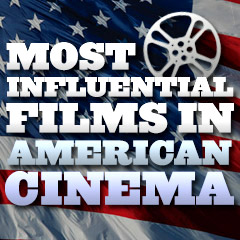Most Influential, Significant
and Important Films in American Cinema
(chronological by time period and film title)
|
|
Title Screen
|
Film Title/Year/Director/Length/Studio,
Descriptions of Influence/Significance |
Poster
|

|
Bridesmaids (2011)
d. Paul Feig, 125 minutes, Universal Pictures
- Universal's female-driven, R-rated, low-budget matrimonial
comedy with strong sexual
content and crude language performed very well during the summer of 2011.
Other raunchfest films that were similar included The Hangover
Part II (2011),
WB's (New Line) Horrible Bosses (2011),
and Sony/Columbia's Bad Teacher (2011).
- The mainstream, female ensemble comedy (a
major chick-flick) became the highest grossing R-rated female comedy
of all time in the domestic box office at $169 million, edging
out Sex
and the City (2008) at
$152.6 million. Ultimately, it took in $288.4 million (worldwide).
The raunchy female comedy proved that women could be just as funny
and outrageous as male performers.
- It out-performed producer Judd Apatow's previous
film Knocked
Out (2007), and became the first Apatow-produced film to be
nominated for an Academy Award (Best Supporting
Actress for Melissa McCarthy and Best Original Screenplay for Kristen
Wiig and Annie Mumolo). As a result of the film, Melissa McCarthy
became one of the decade's
most bankable and break-out comedy movie stars.
- The film became a cultural phenomenon and was the
biggest female comedy of the decade. It stirred up discussion of
edgy, female-centric comedy in Hollywood, and opened to an unexpected
$26.2 million, with an audience that was 67% female. It proved
that the male-dominated subgenre of raunchy R-rated films (There's
Something About Mary (1998), American Pie (1999),
and The Hangover (2009)) could
easily be duplicated and overtaken by the opposite gender. It also
portrayed the female characters as multi-dimensional and real,
rather than as stereotypes in most rom-coms.
|
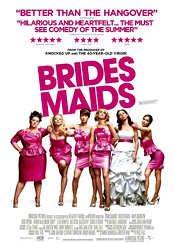
|
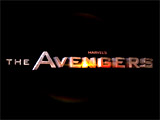
|
The Avengers (2012) (aka (Marvel's)
The Avengers)
d. Joss Whedon, 143 minutes, Buena Vista, Marvel Studios (and Paramount
Pictures)
- This film announced the prominence of the Marvel
Cinematic Universe and Marvel Studios for the remainder of the
decade - it featured
a slew of iconic Marvel Comics superheroes - a group led by one-eyed,
eye-patch-wearing spymaster Nick Fury (Samuel L. Jackson), the
leader of a government high-tech law enforcement agency named S.H.I.E.L.D.
It was the first superhero film to bring together a number of
different characters (from the Marvel catalogue) into one film,
and brought about a surge in rebooted and reimagined franchise
films.
- It was the sixth film in the Marvel
Cinematic Universe - released after Disney’s
acquisition of Marvel Studios in 2009, and led to the increased popularity
of comic-book films beyond the typical comic-book fan
- Budgeted at $220 million,
it was the highest-grossing (domestic) superhero film of all
time for many years, with $623.4 million. (During its reign
as the # 1 superhero film, the second-place superhero film
wasn't even close, the Batman franchise's The
Dark Knight (2008) at $534.9 million.) It was ultimately
surpassed 6 years later by Marvel's Black Panther (2018) -
the 18th installment in the Marvel Cinematic Universe.
- At the time of its release, it became the third
highest-grossing film of all-time, with worldwide revenue of $1.52
billion, behind Titanic (1997) at $2.194 billion and Avatar
(2009) at $2.79. Ultimately, it was surpassed by two
of its sequels and other popular franchise films.
- It soon led to at least three
sequels: writer/director Joss Whedon's Avengers: Age of Ultron
(2015) - the
eleventh film in the Marvel Cinematic
Universe, Anthony and Joe Russo's Avengers:
Infinity War (2018) - the 19th film in the Marvel
Cinematic Universe, and at the end of the decade Avengers:
Endgame (2019) - the 22nd film in the Marvel
Cinematic Universe.
- In the decade of 2010 (from 2010-2019), there were
21 Marvel
Cinematic Universe films - the notion of a "cinematic universe"
had now become a standard studio model.
|

|
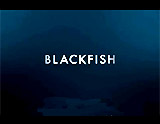
|
Blackfish (2013)
d. Gabriela Cowperthwaite, 83 minutes, CNN Films, Manny O Productions
- This sensationalizing, passionate news-documentary
feature was an expose about the harmful treatment of captive
Orca whales at a prominent ocean aquarium - SeaWorld (San Diego,
CA). On a very low budget of $76,000, the film earned revenue
of $2 million (domestic), and $2.3 million (worldwide).
- It told the story of Tilikum, an aggressive Orca
(captured off Iceland's coast in 1983) that was involved in the
deaths of three people, emphasizing the consequences of keeping
wild creatures in captivity. The wild-caught creature, who exhibited
extreme stress in captivity, was subsequently harrassed by other
captive Orcas at the facility, and naturally lashed out at its
breeding program and forced show-performances. The film emphasized
how the deaths should have been blamed on the humans, not on
the highly-intelligent killer whale being kept in the facility.
- The film increased public perceptions and raised
public concern and awareness about the issue, led to numerous
laws to help protect Orcas in captivity, and contributed to a
decline in SeaWorld's attendance and revenue. By late 2014, SeaWorld's
popularity plummeted, and its stock fell by 50%.
- In response to the film, SeaWorld announced plans
in late 2015 to end killer-whale shows at its theme park in San
Diego, and then in early 2016 claimed it would end its Orca breeding
program and start phasing out all live performances using Orcas.
The present generation of Orcas would be their last.
- In its defense, however, SeaWorld argued that
the documentary was "inaccurate and misleading" and a sensationalized
piece of biased and unbalanced film-making that was purposely
slanted to push its activist agenda against SeaWorld.
|
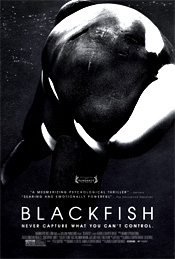
|

|
Frozen (2013)
d. Chris Buck, Jennifer Lee, 102 minutes, Walt Disney Animation Studio
- By winning the Best Animated Feature Oscar prize,
Disney's hit musical Frozen (2013) became the first non-Pixar,
Walt Disney Animation Studios film to win the Best Animated Feature
prize since the category was created in 2001. By springtime of
2014, Disney's loose retelling of Hans Christian
Andersen's fairy tale "The
Snow Queen," became the highest-grossing animated movie of all
time. It overtook Toy Story 3 (2010) (the first animated movie
in history to cross the $1 billion mark) in the top spot, with its
continually-growing estimated worldwide box-office haul up to $1.28
billion. Its domestic take was $400.7 million. Later, it was
surpassed by the remake of The Lion King (2019), that took
in $543.6 million (domestic) and $1.656 billion (worldwide).
- Released around
Thanksgiving. Frozen (2013) was the first animated feature
in Disney's studio history to offer two princess heroines. Disney's
fairy-tale traditions would forever be revised or rethought.
- At the time of its release, it marked the highest-earning
film with a female director in terms of US earnings, until surpassed
by Warners' Wonder Woman (2017). The strength of its earnings
proved the box-office power of female moviegoers.
- It won two Oscars: Best Animated Feature Film and
Best Original Song ("Let It Go").
- Its home video DVD release became a best-seller
and topped sales charts in 2015.
- Its sequel Frozen II (2019) grossed even more: $474.5
million (domestic) and $1.437 billion (worldwide).
|
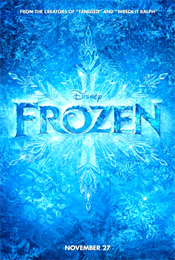
|
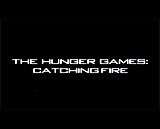
|
The Hunger Games: Catching Fire (2013)
d. Francis Lawrence, 146 minutes, Lionsgate
- The entire franchise of four sci-fi adventure Hunger
Games films
(from 2012 to 2015) was based on Suzanne Collins'
Young Adult series.
- This second installment was the highest grossing
of the entire franchise, at $424.7 million (domestic) and $865
million (worldwide). It was the # 1 film of 2013 - a significant
fact because it had been a long time since a female-led movie (that
was female co-produced) topped the yearly domestic box office,
stretching back to The Exorcist (1973).
- Franchise star Jennifer Lawrence (as Katniss Everdeen)
solidified her position as a powerful female movie star and pop-culture
icon, with her portrayal of a strong, tough, resourceful, independent
and rebellious warrioress.
|
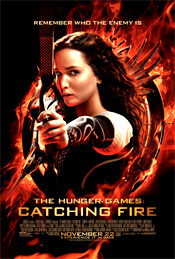
|

|
American Sniper (2014)
d. Clint Eastwood, 133 minutes, Warner Bros.
- This biographical war drama, a pro-military, pro-patriotism
and pro-2nd Amendment film reflected the polarization of the country
in the mid-2010s. Rush Limbaugh called its box office success "an
extension of the November elections." It stirred and roused
continuing debates about the Iraq War. It was charged with emphasizing
sheer jingoism and pro-war revisionist propaganda, although it
also portrayed Middle East foreign policy and military ventures
as noble and heroic.
- It told the cautionary story of a military hero
- a Navy SEAL sniper during the Iraq War named Chris Kyle (portrayed
by Bradley Cooper), who became a fallen warrior after being murdered
by a troubled veteran (Eddie Routh) who suffered from Post-Traumatic
Stress Disorder (PTSD). The film was based upon Kyle's 2012 memoir,
although modified in various ways.
- The R-rated film grossed $350.1 million (domestic)
- a remarkable achievement since it wasn't part of a franchise.
It was released in late 2014, and therefore most of its revenue
was attained in the year 2015, where it ranked as the 6th highest
film (domestically); it was the only film that year to rank that
high without being part of a franchise or a Disney property; ultimately,
it was the highest-grossing (domestic) film of the year 2014.
- The film ignited the issue of care for returning
veterans (often psychologically damaged), and helped to spark efforts
to support and treat them.
- It became the highest-grossing war
film of all
time (unadjusted for inflation), surpassing Saving Private Ryan (1998)
- It acquired six Oscar nominations, with one win
for Best Sound Editing, and it was AFI's "Movie of the Year"
|
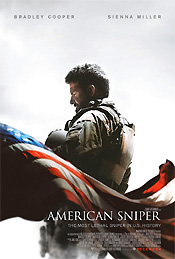
|

|
Mad Max: Fury Road (2015)
d. George Miller, 120 minutes, Warner Bros.
- Co-writer/director George Miller's
latest installment (the fourth, resuscitated by Miller himself)
of a long-running series of Mad
Max films
(going all the way back to 1979) was one of the greatest action
and chase films ever made.
- It featured a fierce, post-apocalyptic, one-armed
heroine Imperator Furiosa (Charlize Theron) was searching for
a long-lost childhood utopia ("The Green Place"), and
was in combat against tyrannical warlord Immortan Joe situated
in a stronghold known as the Citadel, who was supported by a group
of War Boys. The Max Rockatansky road warrior character (often
played by Mel Gibson), was ably portrayed by Tom Hardy.
- The exhilarating film had an astonishing 10 Academy
Award nominations (including Best Picture and Best Director) and
won six (Best Production Design, Best Film Editing, Best Costume
Design, Best Sound Editing, Best Sound Mixing, and Best Makeup
and Hairstyling).
- The explosive, wild, and kinetic film was lauded
for its 'fever-dream' pitch and non-stop violence and
destruction amidst an apocalyptic, dystopic world of limited resources
(milk, water, bullets, blood, gasoline, etc.). A single thrilling
chase sequence across the desert wasteland became an entire engrossing
movie.
|
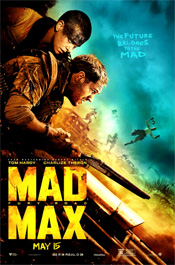
|

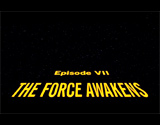
|
Star Wars: Episode VII - The Force Awakens (2015)
d. J.J. Abrams, 138 minutes, Lucasfilm
- The release of the 7th Star Wars franchise film
was monumental, since it had been 10 years since the last installment-episode
of the wildly-successful, fan-favorite series, Star Wars: Episode
III - Revenge of the Sith (2005).
- Many box-office records were broken almost immediately.
It had a production budget of $245 million, and box-office gross
receipts of $936.7 million (domestic), and $2.068 billion (worldwide).
It was the highest-grossing (domestic) film of 2015, besting second
place
Jurassic World (2015) at
$652.3 million. By the end of the decade, the film
remained the highest-grossing (domestic) film of all-time, if unadjusted
for inflation.
- However, its five nominations for Academy Awards
brought no wins: Best Film Editing, Best Original Score (John
Williams), Best Sound Mixing, Best Sound Editing, Best Visual Effects.
- This was the first part of a new sequel trilogy
of Star
Wars (Episodes VII, VIII and IX) and the seventh film in
terms of chronology (it was the chronological sequel to Star
Wars: Episode VI - Return of the Jedi (1983), released
32 years earlier); it also spawned two anthology spin-off films
during the decade: Rogue One: A Star Wars Story (2016) and Solo:
A Star Wars Story (2018)
- The newest addition was the first
in a new trilogy, teaming up the older generation of Rebel heroes with
a new generation of freedom-fighting Resistance heroes - to continue
their fight against oppressive, militaristic, and tyrannical forces
of the First Order.
- Remarkably, it was the first of
the Star Wars films without series creator George Lucas'
involvement, and the first film to be released following Disney's
2012 acquisition of Lucasfilm.
- 73 year-old Harrison Ford was named the highest-grossing
movie actor in Hollywood history, due to Star
Wars: The Force Awakens (2015).
|
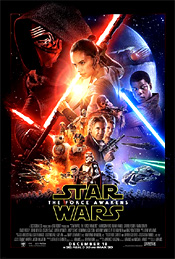
|

|
Moonlight (2016)
d. Barry Jenkins, 111 minutes, A24
- The 2016 Best Picture winner was Moonlight (with
three wins from its eight nominations), also taking Oscars for
Best Supporting Actor (Mahershala Ali) and Best Adapted Screenplay
(for its director Barry Jenkins, from a story by Tarell Alvin McCraney).
Its director Barry Jenkins became the 4th
black helmsmen to be nominated in the Best Director category. It
was the first Best-Picture winner from an African-American director.
- The top film, initially an underdog to La La
Land (2016), was a coming-of-age dramatic love tale (the
director's second film) told in three chapters or time periods
with three different actors- about black youth Chiron (a young
gay black man) living in a crime-infested rough area of Miami
with his crack-addicted mother Paula (Naomi Harris). Its
tagline - about the development of black masculinity, was: "THIS
IS THE STORY OF A LIFETIME."
- It was the first LGBTQ film
to win the Oscar for Best Picture. [Note: LGBTQ = lesbian, gay,
bisexual, transgender, and queer (and/or questioning) individuals/identities.]
And it became the first Best Picture winner without a single
white cast member. Its best scenes were the development of Chiron's
friendship with neighborhood dealer
Juan (Mahershala Ali) and his partner Theresa (Janelle Monae).
- It was one of the lowest
grossing Best Picture
winners ever, had a very small production budget of $1.5 million,
and was released by independent distributor A24, with support from
Brad Pitt’s Plan B Entertainment.
- It was released a month before the 2016 presidential
election and reflected society's troubled times.
|

|

|
Get Out (2017)
d. Jordan Peele, 104 minutes, Universal Pictures
- Director-writer/actor Jordan
Peele's small-budgeted independent horror film (his directorial
debut feature film), with
a budget of $4.5 million and box-office gross of $176 million (domestic),
was easily one of the most profitable movies of all-time
- and the 15th highest-grossing (domestic) film of the year. Ultimately,
it was the most profitable film of 2017 - with a whopping 630%
return on investment.
- The original film (not a remake or reboot!) about
institutional racism had
the highest-grossing original screenplay debut. It
received the Academy Award for Best Original Screenplay, the first
for an African-American nominee. He was the first black filmmaker
(and the third filmmaker of all time, after Warren Beatty for Heaven
Can Wait (1978) and James L. Brooks for Terms
of Endearment (1983)), ever
nominated for the trifecta of directing, writing, and producing
in the same year for his debut feature film.
- The creepy and effective satire on race relations
and white hubris hinted at 'The Stepford Wives' and Guess Who's
Coming to Dinner. The film's plot was simple - young, easygoing
African-American photographer Chris Washington (Daniel Kaluuya)
met his white girlfriend Rose's (Allison Williams) family, the
privileged, wealthy and white liberal Armitages (led by hypnotherapist
Missy (Catherine Keener)) for the first time during a weekend trip
to their secluded home in the woods - a family with incredibly-disturbing
secrets.
- It was wildly and unexpectedly successful due to
its timely subjects of prejudice and systemic racism. It was released
shortly after the 2016 Presidential election as a response to a "post-racial" America
(and a time period of benevolent racism). It pulled off the trick
of being thought-provoking, sometimes funny and truly scary -
all at the same time.
- Peele's nomination for Best Director made him the fifth black
director ever nominated for the Oscar. Jordan Peele soon acquired a
reputation as a writer-director with compelling and rich storylines
(with African-American themes and characters) in this and other
follow-up horror films, including the home-invasion film Us
(2019) and the sci-fi horror movie Nope (2022).
|
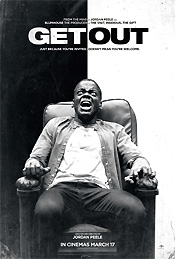
|
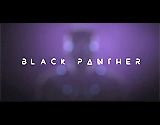
|
Black Panther (2018)
d. Ryan Coogler, 134 minutes, Disney/Marvel
- Director Ryan Coogler's superhero film was the 18th
release in Marvel's Cinematic
Universe franchise.
Chadwick Boseman played the character of Black Panther (the crime-fighting
king T-Challa), the first black hero in the series to be the title
character of a film. In the story,
the superheroic T’Challa returned to his remote African kingdom
(the fictional African country of Wakanda) to assume the throne.
- In greater detail, the plot told about the conflict
that developed between King T'Challa (Chadwick Boseman) of the
reclusive, technologically-advanced (and fictional) African nation
of Wakanda, who as the Black Panther, fought off challenges to
his rule by teaming up with CIA agent Everett K. Ross (Martin Freeman)
and members of the all-female special forces of the Dora Milaje,
to combat his misguided, villainous, anti-isolationist, rival challenger
Erik 'Killmonger' Stevens (Michael B. Jordan).
- The film became the top-grossing film
in history by a black director (Ryan Coogler) and featured a largely
black cast. Incidentally, it was Marvel's first film directed by
an African-American, and the first Marvel superhero movie to be
Oscar-nominated for Best Picture. it
was the highest-grossing (domestic) film of 2018, and it was Marvel's first black
superhero standalone film.
- It was the biggest non-Star Wars opener
since Jurassic World (2015) (that
had a prime June or summer blockbuster release date, with $208.8
million). It marked the studio's
18th straight number one opening. Eventually by the end of March
2018, it bypassed the total box-office (domestic) of The Avengers
(2012) (at $623.3 million) - and attained $700 million and
$1.382 billion (worldwide) in its
theatrical run. It was only surpassed a year later by another Marvel
product,
Avengers: Endgame (2019), with $858.4 million (domestic).
- A
less popular but equally-engaging superhero film sequel was Black
Panther: Wakanda Forever (2022).
|
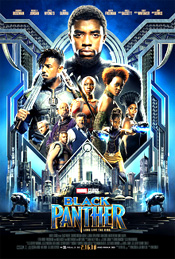
|

|
Joker (2019)
d. Todd Phillips, 122 minutes, Warner Bros./Village Roadshow Pictures
- This dark, nihilistic, bleak and violent DC comic-book
Batman movie thriller was unlike many others. It provided
a unique and serious iteration of the DC Comics superhero
character as a mentally-ill Batman
villain.
- The arch-villain title character had already been
played by Cesar Romero (a spin-off from the 1960s camp TV series, Batman,
The Movie (1966)), Jack
Nicholson (as Jack Napier/the Joker in Tim Burton's Batman
(1989)),
Heath Ledger (in The Dark Knight
(2008)),
and Jared Leto (in Suicide
Squad (2016)). The violent, delusional,
sociopathic Gotham City title character was memorably portrayed
by Oscar-winning Joaquin Phoenix.
- Director Todd Phillips envisioned a revisionist
Batman origin story about a failed and mentally-unstable, wanna-be
stand-up comedian Arthur Fleck (Joaquin Phoenix) in the early 1980s
in Gotham City. Phillips' film paid homage to two classic Martin
Scorsese films: Taxi Driver (1976),
and The King of Comedy (1982).
- Arthur Fleck wore a mask for his day job as a
party clown. The impoverished Fleck lived with his sickly mother
Penny (Frances Conroy) and struggled with mental illness himself.
After being bullied and ridiculed and losing his weekly therapy
sessions and regular medications, Fleck began a slow and mad descent
as he transformed himself into his alter-ego - an infamous, murderous,
psychopathic, mentally-ill, criminal mastermind known as the Joker.
- Although the R-rated film spurred fears of anarchic
violence in its wake, the fears were unfounded, and it became a
blockbuster hit, with revenues of $335.5 million (domestic), and
$1.074 billion (worldwide), on a budget of $55 million. Its total
worldwide earnings made it the # 1 R-rated film of all-time..
- It also received
a total of 11 Academy Award-Oscar nominations (including Best Picture),
with 2 wins, Best Original Score and Best Actor. This marked the
most nominations for a comic book-based superhero movie in Academy
history. It was also only the second comic-book superhero (or super-villain)
movie in history to earn a Best-Picture nomination, following the
previous year's Black Panther (2018) (with six nominations
and three wins).
- Todd Phillips became the first director ever to receive a Best
Director nomination at the Academy Awards for a comic book film.
|
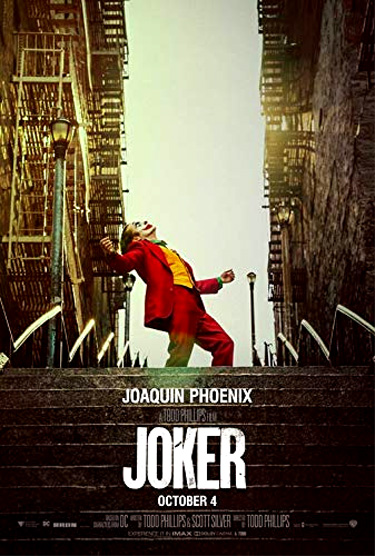
|
